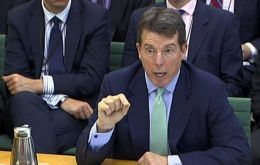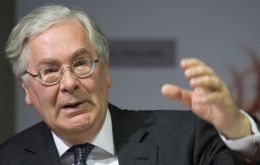MercoPress. South Atlantic News Agency
Tag: Bank of England
-
Thursday, July 5th 2012 - 22:25 UTC
Bank of England pumps further £50 billion to the economy; total stimulus £375 bn

The Bank of England has announced on Thursday it will pump a further £50bn into the UK economy over the next four months through its quantitative easing (QE) program to try to help the economy.
-
Thursday, July 5th 2012 - 22:20 UTC
China cuts interest rate a week ahead of next week’s release of second quarter stats

China's central bank cut interest rates for the second time in two months to bolster an economy widely expected to record its sixth successive slide in growth in April-June.
-
Wednesday, July 4th 2012 - 23:00 UTC
Libor rate manipulation: Barclays’ former CEO does not convince PMs and points to Bank of England

British banker Bob Diamond has revealed that one of his big fears during the 2008 global credit crisis was that his bank, Barclays, would be taken over by the British government.
-
Wednesday, July 4th 2012 - 05:58 UTC
Barclays CEO resigns as the Libor rate fixing scandal widens

UK Barclays chief executive Bob Diamond suddenly quit on Tuesday over an interest rate-rigging scandal that threatens to drag in a dozen more major lenders but suggested the Bank of England had encouraged his bank to manipulate the figures
-
Friday, June 8th 2012 - 20:51 UTC
Bank of England stand-by on optimism over a solution to the Euro debt crisis

The Bank of England has resisted injecting further emergency liquidity to the UK economy as optimism over finding a solution to the Euro zone debt crisis grew.
-
Friday, May 25th 2012 - 01:16 UTC
UK deeper in recession; IMF recommends more stimuli measures

Britain fell deeper into recession than initially thought in the first quarter of 2012 due to a slump in construction output, raising the likelihood that the Bank will opt to inject more stimuli to protect the economy from the Euro zone debt crisis.
-
Thursday, May 10th 2012 - 20:08 UTC
Bank of England forgets stimulus and targets inflation in spite or recession

Bank of England policymakers on Thursday decided against pumping more cash into Britain's recession-hit economy, preferring to sit tight after a surprise spike in inflation.
-
Friday, May 4th 2012 - 00:31 UTC
Bank of England governor admits more should have done to prevent the crisis

After coming under fire for years for refusing to accept responsibility for the crisis, Bank of England governor Mervyn King said in his BBC Today Program Lecture that the BoE should have done more -- but added that the bank's hands had been somewhat tied.
-
Thursday, February 9th 2012 - 20:25 UTC
Bank of England pumps an extra £ 50bn to boost the UK economy

Bank of England has agreed to extend its quantitative easing (QE) program by £50bn to give a further boost to the UK economy. When completed, it will bring the total amount of QE stimulus to £325bn.
-
Thursday, January 26th 2012 - 05:28 UTC
Fears UK economy might have entered a mild recession at the end of 2011

Britain's economy may have entered a mild recession in the last three months of 2011, hampering the government's core policy aim of spurring growth and raising the chances that the Bank of England will inject more cash soon.
